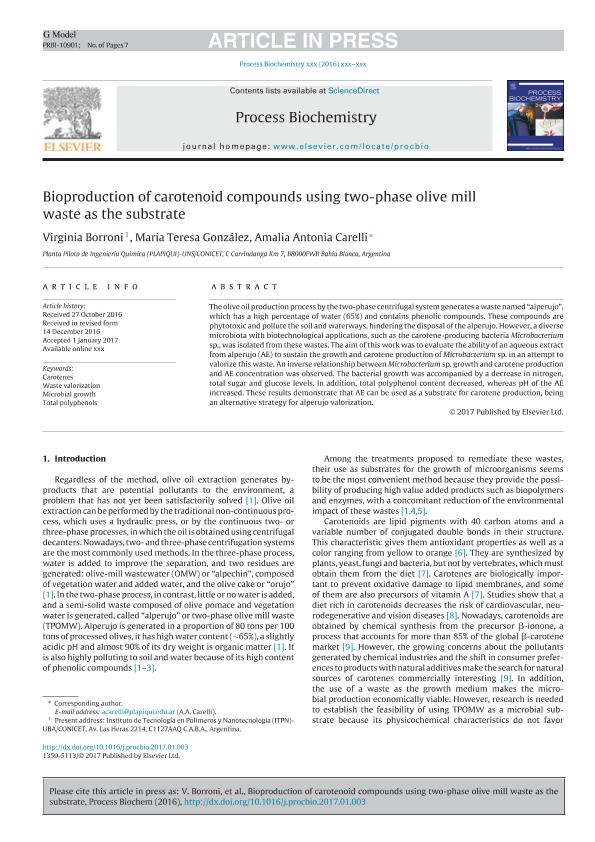Artículo
Bioproduction of carotenoid compounds using two-phase olive mill waste as the substrate
Fecha de publicación:
03/2017
Editorial:
Elsevier
Revista:
Process Biochemistry
ISSN:
1359-5113
Idioma:
Inglés
Tipo de recurso:
Artículo publicado
Clasificación temática:
Resumen
The olive oil production process by the two-phase centrifugal system generates a waste named “alperujo”, which has a high percentage of water (65%) and contains phenolic compounds. These compounds are phytotoxic and pollute the soil and waterways, hindering the disposal of the alperujo. However, a diverse microbiota with biotechnological applications, such as the carotene-producing bacteria Microbacterium sp., was isolated from these wastes. The aim of this work was to evaluate the ability of an aqueous extract from alperujo (AE) to sustain the growth and carotene production of Microbacterium sp. in an attempt to valorize this waste. An inverse relationship between Microbacterium sp. growth and carotene production and AE concentration was observed. The bacterial growth was accompanied by a decrease in nitrogen, total sugar and glucose levels. In addition, total polyphenol content decreased, whereas pH of the AE increased. These results demonstrate that AE can be used as a substrate for carotene production, being an alternative strategy for alperujo valorization.
Palabras clave:
Carotenes
,
Waste Valorization
,
Microbial Growth
,
Total Polyphenols
Archivos asociados
Licencia
Identificadores
Colecciones
Articulos(ITPN)
Articulos de INSTITUTO DE TECNOLOGIA EN POLIMEROS Y NANOTECNOLOGIA
Articulos de INSTITUTO DE TECNOLOGIA EN POLIMEROS Y NANOTECNOLOGIA
Articulos(PLAPIQUI)
Articulos de PLANTA PILOTO DE INGENIERIA QUIMICA (I)
Articulos de PLANTA PILOTO DE INGENIERIA QUIMICA (I)
Citación
Borroni, Maria Virginia; Gonzalez, Maria Teresa; Carelli Albarracin, Amalia Antonia; Bioproduction of carotenoid compounds using two-phase olive mill waste as the substrate; Elsevier; Process Biochemistry; 54; 3-2017; 128-134
Compartir
Altmétricas




